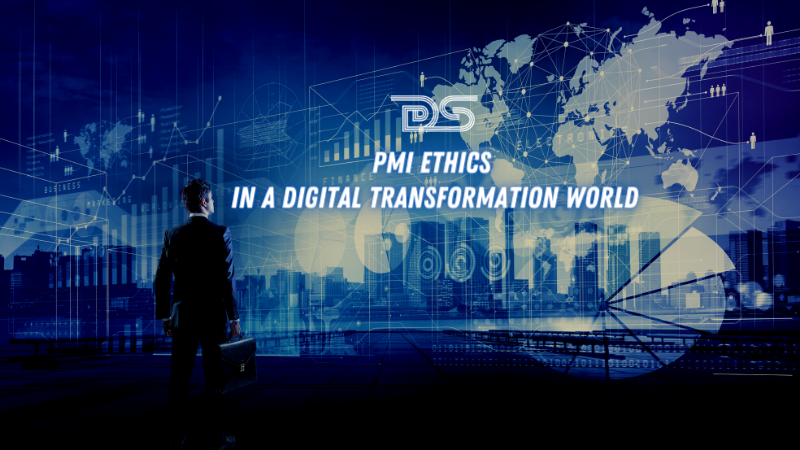
PMI Ethics : In a Digital Transformation World
According to the PMI (Project Management Institute), “Ethics is about making the best possible decisions concerning people, resources and the environment. Ethical choices diminish risk, advance positive results, increase trust, determine long term success, and build reputations. Leadership is dependent on ethical choices”. Ethics represent a crucial differentiator in a highly competitive market where reputation and values are highly appreciated among the Project Management Professionals.
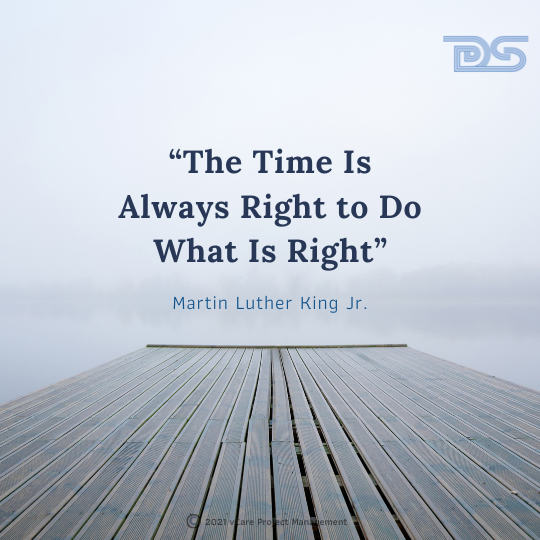
The Time Is Always Right to Do What Is Right
Martin Luther King Jr. said, “The Time Is Always Right to Do What Is Right”. As project managers/program managers or portfolio managers, we must make critical decisions daily. Though in the evolving digital transformation world, many decisions might go unnoticed, few do get noticed, as critical ones. These decisions have a profound impact on people, resources, and the environment. Some decisions might have led to conflicts, dilemma, or the creation of new risks.
What is Ethics, and what is the Role of PMI?
Ethics is the branch of knowledge that deals with moral principles. It involves steps, including systematizing, defending, and recommending concepts of right and wrong behaviours.
Regarding ethics at PMI, in the year 1981, the PMI team formed the PMI Board of Directors on Ethics, Standards, and Accreditation. The current PMI ethics document outlines the essentials of ethics based on Vision, Responsibility, Respect, Fairness, and Honesty. PMI expects its members to adhere to these codes of ethics to uphold its values.
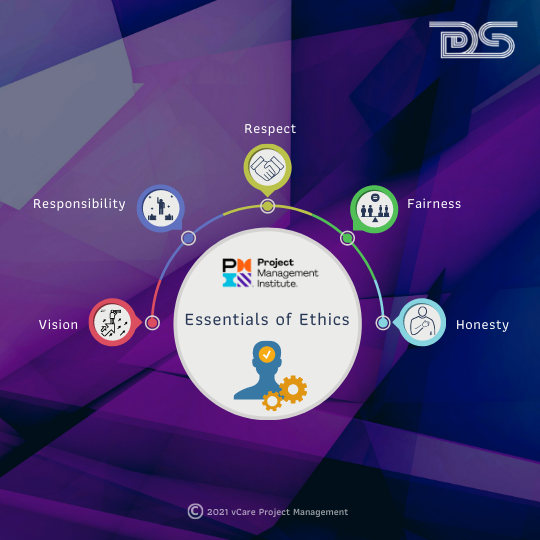
Essentials of Ethics
When the whole world is fighting the COVID-19 situation, and demand for digital transformation projects is at an all-time high, PMI professionals need not ask for a better time to establish high ethical standards. Let’s understand the key challenges a PMI trained professional faces in the current digital transformation world.
Digital Transformation
Digital transformation is the process of using digital technologies to create new — or modify existing — business processes, culture, and customer experiences to meet changing business and market requirements.
There are four types of digital transformation: business process, business model, domain, and cultural/organizational. We often see corporations focused solely on the process or organizational transformation.
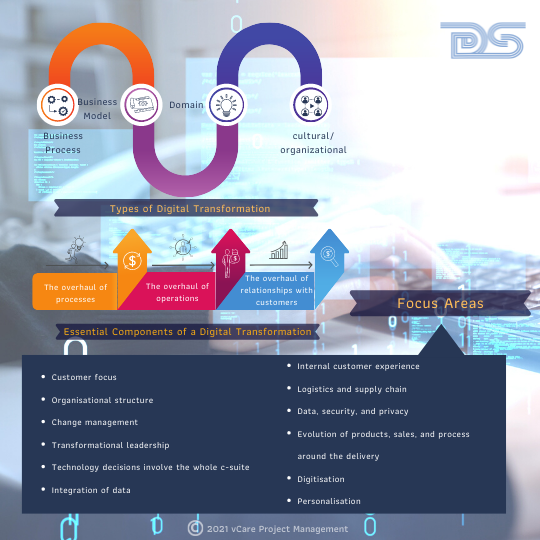
Digital Transformation
There are three essential components of a digital transformation:
- The overhaul of processes
- The overhaul of operations, and,
- The overhaul of relationships with customers.
The crucial elements that every digital transformation program needs to focus on are,
- Customer focus
- Organisational structure
- Change management
- Transformational leadership
- Technology decisions involve the whole c-suite
- Integration of data
- Internal customer experience
- Logistics and supply chain
- Data, security, and privacy
- Evolution of products, sales, and process around the delivery
- Digitisation
- Personalisation
The key aspects of the digital transformation world could have a major impact on Ethics.
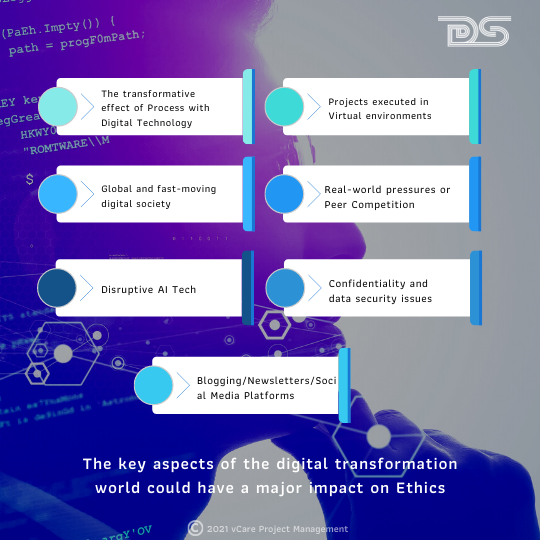
Major impact on Ethics
The transformative effect of Process with Digital Technology: Award-winning Author James Moor in 1985 mentions the transformative effect Digital Transformation could create. He cites the example transformation of manual votes to Electronic Voting Machines, which might benefit from speed and accuracy. On the contrary, it could impact security, vulnerability, transparency, and trustworthiness related issues.
Projects executed in Virtual environments: Today, the projects get implemented in remote places – Home/Office/Small Office combinations. People are working from remote, and it has become the new normal. People significantly use collaboration tools and in some occasions even communicate using social media, which could be manipulative.
Blogging/Newsletters/Social Media Platforms: Professionals tend to share the experience and insights reflecting upon the work ecosystem. Either sharing happens as an experience in a newsletter or a blog post, or it could be even a Twitter thread or a simple tweet reflecting a view. This act is typically done by those who tend to be expressive even within a professional organizational setup.
Global and fast-moving digital society: Communications spread very fast, and a diverse global culture leaves very little control. Digital technology, which is supposed to help leverage, could turn dangerous. The expectation for responsiveness sometimes leaves very little room for interpretation.
Real-world pressures or Peer Competition: Today’s real-world information sharing creates unwarranted peer pressure. This pressure might develop dilemmas and force individuals towards adverse decision-making. Sometimes, due to competitive peer pressures or financial pressures, even the employees’ health and safety concerns might get overseen.
Confidentiality and data security issues: Enhanced digital transformations across the globe have made data exchange easier. In the case of a data expose, it is vital to understand what is exchanged and what is the importance of the exchanged data. Lack of understanding of the data classification at appropriate levels could become risky when the proper accountability level could not be ascertained.
Disruptive AI Tech: Disruptive AI tech such as Chatbots, Speech Recognition Systems, etc., has made the way we think of data and decision making. Too much dependence or flawed inference might have an impact.
Ethics focus on PMIs Performance Domains & Digital Transformation
When a portfolio/program/project vision is established and defined, observable outcomes between the current state and future state as part of the digital transformation must be counted in. The key components that would impact the above said performance domains would be done with re-imagination, cultural change, and cross-functionality.
Digital transformation might have changed in a newer business model, new product focus, and a more contemporary way of working. Digital transformation is about getting the technology right and building necessary support and buy-in from the people managing resistance. Business processes need to be horizontally redesigned to enable collaboration across the teams.
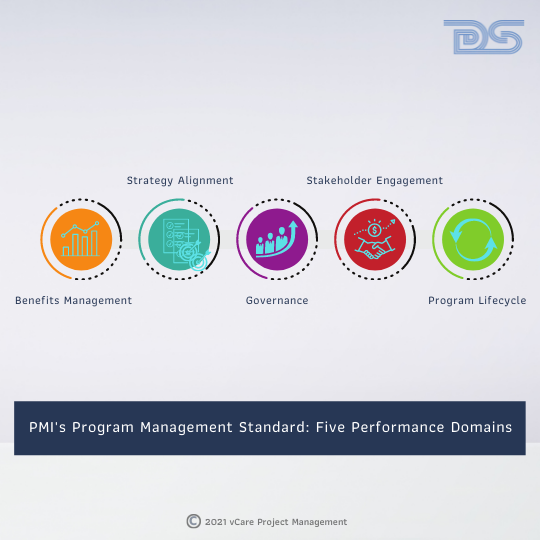
PMI’s Program Management Standard
PMI’s Program Management Standard defines five performance domains that can be integrated with ethics, giving a significant shift in ethics adoption, and may help in improving overall digital transformation initiatives. They are:
- Benefits Management: Benefits profile, which would be based on outcomes and measurement, has to have the ingredients of the ethics as well.
- Strategy Alignment: Strategic alignment to focus on the changing business environment and strategic targets on digital transformation must be governed through ethics.
- Governance: Governance focus and establishes control related to programs. Governance would bring discipline and ethics into the broader organizational structure.
- Stakeholder Engagement: Stakeholders to be kept well informed on the ethical aspects of getting involved whenever any changes in stakeholders.
- Program Lifecycle: Given a structure and suggested flow for a program, the ethics principle has to be adopted to address dilemmas related to circumstances of a business and initiative.
5As Decision-Making framework
PMI has recommended the 5A’ss decision-making framework outlines with Assessment-Alternatives-Analysis-Application-Action. The 5A’s assessment helps to collate all the facts about the ethical dilemma. It considers all your choices. Subsequently, decision candidates are identified and tested for their validity. Apply these principles to the candidates and make the final decision.
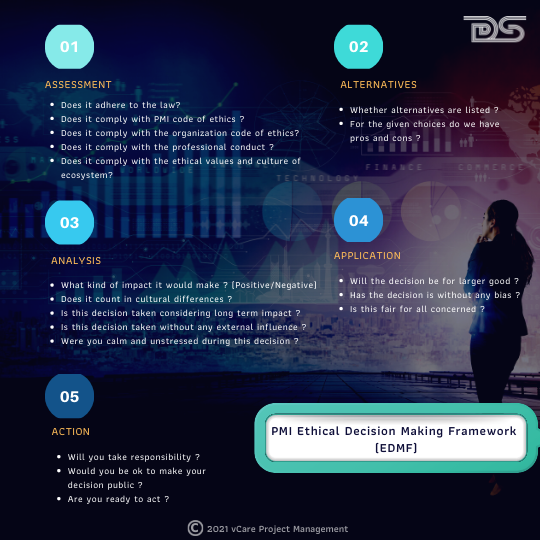
5As Decision-Making framework
The decision-makers, when they adopt the 5A decision-making framework, the following checklist:
Assessment
- Does it adhere to the law?
- Does it comply with PMI code of ethics ?
- Does it comply with the organization code of ethics?
- Does it comply with the professional conduct ?
- Does it comply with the ethical values and culture of ecosystem?
Alternatives
- Whether alternatives are listed ?
- For the given choices do we have pros and cons ?
Analysis
- What kind of impact it would make ? (Positive/Negative)
- Does it count in cultural differences ?
- Is this decision taken considering long term impact ?
- Is this decision taken without any external influence ?
- Were you calm and unstressed during this decision ?
Application
- Will the decision be for larger good ?
- Has the decision is without any bias ?
- Is this fair for all concerned ?
Action
- Will you take responsibility ?
- Would you be ok to make your decision public ?
- Are you ready to act ?
Benefits:
When the portfolio managers and program managers adopt the above-said approach outlined in the PMI code of ethics, it provides the following benefits:
- Elevates the profession and raises future standards
- Increases the faith and trust among peers
- Imprints on individual moral mindsets and behaviors
- Improves business relationships across the board
- Promotes fair decision making
- Reduces project risks
- Reduces anxiety and stress and ultimately turnover in projects
Conclusion
Transparency and integrity must be the core values which has to be established by the professionals. The data must be used in responsible and ethical ways during the digital transformation initiative. Data collection has to be based on the ethics principle called “Informed Consent.” The actions cannot be intrusive, manipulative, or disrespectful to others.
Trust must be established among the individuals, groups, or organizations involved in the digital transformations. This trust can be created by establishing data provenance, traceability from the source to the user interface. Program managers or portfolio managers have to act without any bias and with a high level of integrity and impartiality. The same has to be established for the clients, suppliers, and subcontractors without any favoritism and giving them an unfair advantage.

Recent Comments